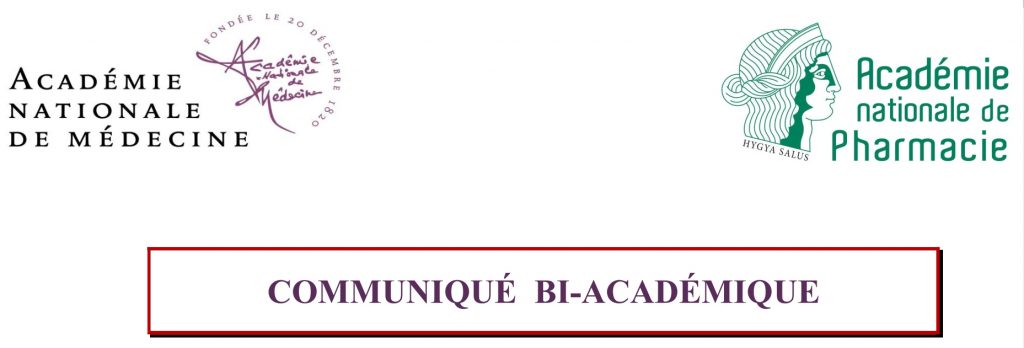TRANSLATION from FRENCH
A communiqué expresses an official position of the National Academy of Medicine.
The Academy, in its session of Tuesday, February 23, 2021, adopted the text of this communiqué by 100 votes to 9, with 14 abstentions. 
National Academy of Medicine, National Academy of Pharmacy
Bi-Academic Communiqué
On January 14, 2020, a parliamentary mission was tasked with reviewing the regulation and the impact of different uses of cannabis in its aspects “therapeutic”, “well-being”, and even “recreational”.
In September 2020, the mission issued a first report on the medical use of cannabis. A communiqué from the National Academy of Pharmacy (1) denounced a procedure that contravenes the regulatory, safety and ethical requirements for medicines due to lack of an assessment of the benefit/risk ratio strictly necessary for any candidate for a therapeutic label.
Continuing the investigation of the “well-being cannabis ” and “recreational cannabis” components, the same parliamentary mission launched via the Internet a “citizen consultation” on recreational use of cannabis. The National Academy of Medicine and the National Academy of Pharmacy are astonished that a questionnaire with numerous methodological biases has been proposed, leading users to provide the answers desired by those who questioned them.
Moreover, this questionnaire deals with essentially medical questions without any prior pedagogy. It asks citizens to compare the dangerousness of the cannabis and its THC (tetrahydrocannabinol) to that of alcohol and tobacco, without the following elements being taken into account:
– the recreational use of cannabis is done by inhalation of smokes, the more often with tobacco. This disguised encouragement of smoking defeats the objective of reducing its number of preventable deaths (75,000 per year) through a «zero tobacco» policy, like that committed by several countries;
– the now very strong scientific data (2) on cardiovascular, cerebrovascular, pulmonary, psychiatric and immune toxicities of cannabis, as well as its deleterious effects on pregnancy and the unborn child…;
– the impact of epigenetic modifications (3) on the gametes of individuals of age to procreate at the origin of epigenetic modifications, sources of abnormalities in the neuro-development and subsequent addiction;
– the THC vulnerability of adolescent and young adult brains (4) (related to their cerebral maturation not yet completed, and which will not be until they are around age 25);
– the impact on accidents at work and on public roads: the search for narcotics is positive in 23% of subjects involved in a fatal accident; while cannabis consumption alone multiplies by 2 the risk of fatal accident; this risk is increased by 30 when alcohol is associated with it (5)
The aim of a health policy is to inform and prevent the consequences of a behaviour, of a consumption. Yet prevention and information are almost non-existent in educational programs in schools or universities: thus the European Monitoring Centre for Drugs and Drug Addiction, in its 2017 report, blamed France, the leading cannabis user in Europe.
In its 2019 report “Consumption of licit and illicit drugs among adolescents: an alarming situation that requires early prevention”, the National Academy of Medicine has made proposals, whose, to date, have remained a dead letter.
It is in this context that this citizen consultation arises, whose proposed items are obviously oriented, not towards a public health approach, but towards a control of the illegal cannabis market. This objective is utopian, as shown by the situation in Canada where the legalization of recreational use of cannabis has not eliminated the parallel market.
The latter remains dominant, as supply remains flourishing – and at a lower cost to the user – for a cannabis containing higher concentrations of THC, compared to legally marketed products.
The argument of revenues resulting from the taxes collected on the sale of legalized cannabis is an illusion: as with tobacco, health and social expenses induced will far exceed the tax revenues. A recent study in the state Colorado shows that for every dollar collected in tax revenues, the State spends approximately $4.50 to address the health and social effects of cannabis legalization (6).
In France, taxes on alcohol and tobacco cover only 37% and 40% respectively of the cost of care generated by illnesses secondary to their consumption (7)?
The Academies of Medicine and Pharmacy, at the origin of this communiqué, call for a reconsideration of the citizen consultation process implemented by the parliamentary mission aiming at evolving the cannabis regulation. They recommend that, prior to any initiative, an objective information be provided to all citizens on the health, medico-social and economic consequences of cannabis use. In view of these elements, they opposed to the simplistic and highly oriented interpretation that could be made of the citizen consultation in progress.
1- Communiqué du 24 novembre 2020
2- Maladies liées à la consommation de cannabis. Dossier thématique. Presse Med Form, 2020, 1 : 258-284 et 355-409.
3- Costentin J. Les effets épigénétiques du cannabis/tétrahydrocannabinol. Bull Acad Natl Med. 2020, 204 : 570-576.
4- Krebs M.-O., Demars F., Frajerman A., Kebir O., Jay T. Cannabis et neurodéveloppement. Bull Acad Natl Med. 2020, 204 : 561-569.
5- Observatoire national interministériel de la sécurité routière, statistiques 2019
6- Economic and social costs of legalized marijuana, Centennial Institute, Colorado
University, November 2018, 94 pp.
7- Kopp P.A. Le coût social des drogues en France. Observatoire français des drogues
et toxicomanies, Bull Acad Natl Med, 2019, 203 : 193-200.
Thank you for reading


